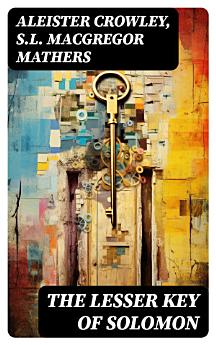The Lesser Key of Solomon
Aleister Crowley · S.L. MacGregor Mathers
Nov 2023 · DigiCat
Ebook
94
Pages
family_home
Eligible
info
reportRatings and reviews aren’t verified Learn More
About this ebook
The Lesser Key of Solomon is a captivating anthology that delves into the mystical and occult practices of the early 20th century, skillfully combining a diversity of magical texts that reflect the spiritual and literary landscapes of its time. Within this collection, readers will find a rich tapestry of the arcane, illustrated through rituals, incantations, and summoning techniques that encompass a range of esoteric traditions. This spellbinding assortment stands as a testament to the enduring human fascination with the unknown and the magical realm, offering standout passages that house both poetic beauty and dark allure. Bringing together the profound insights of prolific occultists Aleister Crowley and S.L. MacGregor Mathers, this anthology captures voices deeply entrenched in the cultural and spiritual revivals of their era. Crowley and Mathers, influential figures in their own right, provide a window into the mystical movements that shaped their legacies, aligning with the broader cultural symbiosis of Hermeticism, occultism, and ceremonial magic. Their contributions in this volume enrich the reader's understanding of these movements, offering an elaborate narrative on mystical exploration and esoteric scholarship. The Lesser Key of Solomon is an essential addition to the library of anyone intrigued by the mystical arts, as it offers a rare glimpse into the complex interplay of perspectives that characterize this fascinating domain. This collection is not merely a scholarly resource—it's an invitation to explore the intricate dance between human aspiration and the supernatural. Engage with this anthology to immerse yourself in a world of deep spiritual inquiry and to benefit from the profound dialogue established between the visionary works of Crowley, Mathers, and the traditional lore they rediscover and redefine.
About the author
Aleister Crowley (1875–1947), an influential English occultist, ceremonial magician, poet, painter, novelist, and mountaineer, was a pivotal figure in the early 20th-century esoteric circles and had a significant impact on modern occultism. Born Edward Alexander Crowley, he was venerated in some circles as a prophet and vilified in others as a charlatan. Crowley founded the religion of Thelema, professing that its guiding tenet was 'Do what thou wilt shall be the whole of the Law.' He saw himself as the prophet entrusted with guiding humanity into the so-called Aeon of Horus. Crowley's prolific writings include 'The Book of the Law,' which he claimed was dictated to him by a supernatural entity and became the cornerstone of Thelema. His interest in the occult led him to produce works on various mystical and magical systems, one of which is 'The Lesser Key of Solomon,' also known as 'Lemegeton,' a grimoire that, contrary to some beliefs, was not written solely by Crowley. It is actually a compilation of materials from the 17th century, which he may have edited or introduced to a broader audience. Crowley's literary style is characterized by a blend of eloquent prose and poetry, as well as the use of symbolic and allegorical references to esoteric and mystical themes. Despite controversies surrounding him, Crowley's influence on Western esotericism and countercultural movements can't be overstated, leaving a legacy that endures in the works of later occultists and in popular culture.
Rate this ebook
Tell us what you think.
Reading information
Smartphones and tablets
Install the Google Play Books app for Android and iPad/iPhone. It syncs automatically with your account and allows you to read online or offline wherever you are.
Laptops and computers
You can listen to audiobooks purchased on Google Play using your computer's web browser.
eReaders and other devices
To read on e-ink devices like Kobo eReaders, you'll need to download a file and transfer it to your device. Follow the detailed Help Center instructions to transfer the files to supported eReaders.








